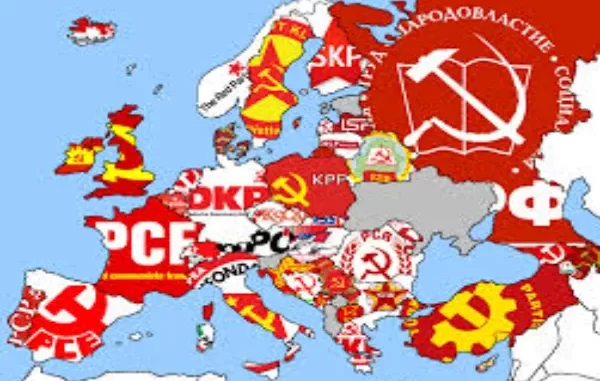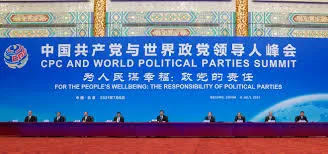
Political parties are an integral part of the political process in many countries around the world. They provide an important platform for people to express their opinions and to participate in the decision-making process. They also serve to mobilize resources and support for particular candidates and ideologies. In this article, we will explore the various types of political parties around the world, their roles, and how they differ from each other. We will also discuss the importance of political parties and how they shape the political landscape in different countries.
Unpacking the Far-Right: Exploring the Political Landscape of Nationalist Movements
The far-right has become an increasingly visible force in the political landscape of many countries. The rise of nationalist movements and far-right ideologies has been seen throughout Europe, the United States, and other parts of the world. As this phenomenon continues to gain momentum, it is important to understand the complex factors at play and the various groups that make up the far-right. This article seeks to provide a comprehensive overview of the far-right by unpacking its various components and exploring the political landscape of nationalist movements.

The far-right is composed of a diverse range of political ideologies and movements, all of which share a common theme of nationalism. These include populism, xenophobia, racism, and religious fundamentalism. Populism is characterized by a focus on the grievances of the “common people” and a distrust of the political elite. Xenophobia is an irrational fear of foreigners or those perceived as different. Racism is the belief in the superiority of one race over another. And religious fundamentalism is an absolutist belief in a particular religious doctrine.
Nationalist movements are often driven by a desire for autonomy and self-determination. This can manifest in a variety of ways, from demands for independence from another country to a call for more autonomy within a larger state. These movements can be further divided into two distinct categories: ethnic nationalism and civic nationalism. Ethnic nationalism is based on a shared cultural or ethnic identity, while civic nationalism is based on shared political beliefs and values.
Far-right parties have been gaining increased support in many countries in recent years. This is due in part to a growing sense of economic insecurity and a feeling that the status quo is no longer working in the favor of the average person. Many far-right parties have taken advantage of this by presenting themselves as the solution to the problems facing their respective nations.
Far-right movements are often associated with extremism and violence. While this is true in some cases, it is important to note that not all far-right movements are violent or extreme in nature. Many far-right parties are simply advocating for more conservative policies and a return to traditional values.
It is clear that the far-right is a complex and multi-faceted phenomenon. By unpacking the various components of the far-right and exploring the political landscape of nationalist movements, we can better understand this phenomenon and the implications it has for society.
Examining the Role of Centrist Parties in Political Systems Around the Globe
Centrist parties are an important part of many political systems around the globe. They serve as a bridge between the left and the right, providing a stable platform for dialogue and compromise. By appealing to both the left and the right, centrist parties are able to bring together disparate factions to find solutions to difficult issues.
Centrist parties often occupy the middle ground between the political spectrum. They may reject extreme policies, instead favoring moderate policies which seek to bring both sides together. This can involve both economic and social policies. For example, a centrist party may support a balanced budget and also support policies which promote social inclusion.

Centrist parties can also be a key factor in electoral systems. They can act as a buffer between the left and the right, taking votes away from the extremes and thus preventing a radical party from gaining power. This can help to ensure that a moderate government is elected, one that is willing to compromise and work towards the best interests of the country.
Furthermore, centrist parties can be a force for stability in a political system. By appealing to both sides of the spectrum, they can help to reduce the risk of political gridlock. This can help to ensure that the government is able to make progress on important issues, rather than being stuck in endless debates.
In conclusion, centrist parties play a crucial role in many political systems around the globe. They are able to bridge the gap between the left and the right, providing a platform for dialogue and compromise. They can also act as a buffer against extreme parties, helping to ensure that moderate governments are elected. Finally, they can be a force for stability, helping to reduce the risk of political gridlock.
Looking at the Ideological Differences of Left and Right-Wing Parties in Europe
The ideological differences between left and right-wing parties in Europe are vast and complex. On one side, left-wing parties typically advocate for economic policies that promote equality and social justice, such as stronger social safety nets, greater government intervention in the economy, and higher taxes on the wealthy. They are also generally more supportive of progressive social policies, such as LGBT rights and gender equality.
On the other hand, right-wing parties tend to favor policies that promote economic freedom, such as cutting taxes and regulations, reducing government spending, and encouraging entrepreneurship. They are also typically more socially conservative and may be opposed to certain progressive policies, such as same-sex marriage.

The differences between left and right-wing parties in Europe have become increasingly pronounced in recent years, with right-wing parties becoming more vocal in their opposition to immigration and other progressive policies. This has resulted in a sharp divide between the two sides, with left-wing parties becoming more left-leaning and right-wing parties becoming more right-leaning.
Overall, the ideological differences between left and right-wing parties in Europe are deep and complex, and will likely continue to shape and influence the political landscape in the region for years to come.
How the Rise of Green Parties is Shaping Politics in the 21st Century
The 21st century has seen the emergence of green parties around the world, and their presence is having a significant impact on politics. Green parties prioritize environmental issues and advocate for sustainable policies. They have a strong focus on climate change and the conservation of natural resources, and they are pushing for a shift away from reliance on fossil fuels and towards renewable sources of energy.

Green parties are playing a major role in the decision-making process of governments across the globe. In countries such as Germany, the Netherlands, and Belgium, they are part of multi-party coalitions and are influential in the formation of national policies. They have also been successful in securing seats in the European Parliament, where they are actively promoting their agenda and pushing for environmental policies to be implemented.
The rise of green parties is leading to an increased focus on sustainability and environmental protection in politics. In particular, green parties are pushing for greater investment in renewable energy sources and the development of green technologies. They are also advocating for more stringent regulations to reduce emissions, as well as incentives to encourage businesses to become more sustainable.
Furthermore, green parties are helping to raise awareness of the importance of protecting the environment. They are encouraging people to become more conscious of their actions and to consider the environmental impact of their decisions. This is leading to a shift in attitudes and behaviors, and more and more people are becoming aware of the need for environmental conservation.
Overall, the rise of green parties is having a profound effect on politics in the 21st century. They are pushing for greater investment in renewable energy sources, stricter regulations to reduce emissions, and more public awareness of the importance of environmental protection. As green parties continue to gain influence, we can expect to see further progress towards a greener and more sustainable future.
Taking a Closer Look at the Impact of Single-Issue Parties on Politics in Different Countries
Single-issue parties are gaining traction in many countries around the world, and their impact on politics in each country can vary considerably. In some countries, single-issue parties have had a significant impact on public policy, while in others they have had a more limited influence. To better understand the impact of single-issue parties on politics in different countries, this paper will explore the various ways in which these parties have shaped political discourse and policymaking.

In the United Kingdom, single-issue parties such as the Green Party have been influential in pushing for environmental policies and greater transparency in government. The Green Party has had a significant impact on the UK’s climate change policies, forcing the government to take action on issues such as air pollution and renewable energy. The Green Party has also pushed for greater public scrutiny of government activities, which has resulted in more openness and accountability from decision-makers.
In the United States, single-issue parties have also had an impact on public policy. The Libertarian Party, for example, has pushed for a smaller government with less regulation, and for greater individual rights. The party has had a significant influence on the US healthcare system, with its push for greater patient autonomy and less government intervention in healthcare decisions. The Libertarian Party has also been influential in pushing for greater economic freedom, including the promotion of free markets and less government intervention in the economy.
In Germany, single-issue parties such as the Free Democratic Party have pushed for greater government transparency, increased government accountability, and a more efficient use of public funds. The FDP has had a significant influence on the country’s fiscal policies, and its efforts have resulted in more efficient use of public funds and greater budget transparency. The party has also pushed for greater gender equality and for more rights for minority groups.
In Japan, single-issue parties have had a more limited impact. While there have been several single-issue parties in the past, none of them have had a lasting impact on public policy. The most successful single-issue party in Japan was the Japan New Party, which was founded in
The party was successful in pushing for greater government transparency and for more accountability from decision-makers, but it ultimately failed to gain a significant foothold in the Japanese political system.In conclusion, single-issue parties have had varying degrees of influence on politics in different countries. In some countries, such as the UK and the US, single-issue parties have had a significant impact on public policy. In other countries, such as Japan, single-issue parties have had a limited impact. However, regardless of the country, single-issue parties have had the potential to shape public discourse and to push for greater accountability from decision-makers.
In conclusion, the exploration of different types of political parties around the world has revealed that political parties come in many shapes and sizes, representing a wide range of ideologies and interests. Political parties serve as a key component of modern democracies, and their presence helps to ensure that the needs of the electorate are represented and addressed. Although the specifics of a party’s platform can vary significantly from one country to the next, the overall purpose of a political party remains the same: to represent the interests of its constituents and help guide a nation towards a better future.

Leave a Reply